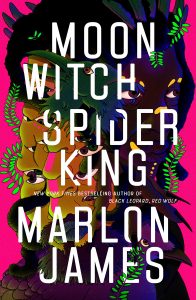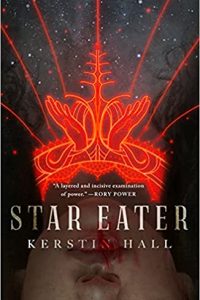Gary K. Wolfe Reviews Moon Witch, Spider King by Marlon James
 Moon Witch, Spider King, Marlon James (Riverhead 978-0-735-22020-1, $30.00, 656pp, hc) February 2022.
Moon Witch, Spider King, Marlon James (Riverhead 978-0-735-22020-1, $30.00, 656pp, hc) February 2022.
The narrative trick of telling the same story from different viewpoints has yielded some genuine classics, from Lawrence Durrell’s Alexandria Quartet to Kurosawa’s Rashomon, and it would seem especially well suited to fantasy epics – which too often tend to have far more characters and settings than actual plot lines. So when readers of Marlon James’s Black Leopard, Red Wolf arrived at the very last page, when our notoriously unreliable narrator Tracker is speaking directly to the inquisitor who is presumably the interlocutor for the entire novel, they might reasonably guess that the next installment of the Dark Star trilogy would belong to Sogolon, the 177-year-old witch who is both collaborator and rival to Tracker. ‘‘I know you’ve heard her testimony,’’ he says, ‘‘So, what does mighty Sogolon say? Do not trust one word coming from Tracker’s mouth?’’ And volume two, Moon Witch, Spider King, does indeed turn out to be Sogolon’s story, but it’s a lot more than just her version of the quest for the mysterious missing boy that powers most of the plot of the first novel. In fact, Tracker and his companions – the Leopard, the giant Sandogo, the bounty hunter Ne Vampi – don’t even show up until some three-quarters of the way into the novel.
Until then, the novel focuses on the long and troubled life of Sogolon, almost taking on the aspect of a Dickensian life history. After her mother dies giving birth to her – before even giving her a name – Sogolon faces repeated abuse by her three older brothers, who blame her for their mother’s death and even try to abandon her in the bush. She learns early on to be a street fighter and survivor, and eventually escapes to the brothel of Miss Azora, who trains her to be a Forbidden Lily, ‘‘for the man with peculiar needs.’’ From there she’s rescued by a socially ambitious noblewoman named Mistress Komwono in the city of Kongor. She begins to discover her own magical powers – mostly involving the ability to summon a powerful whirlwind which she comes to call ‘‘wind (not wind)’’ or ‘‘push’’ – when the master of the house attempts to rape her. Ironically, his death brings the family back into favor at court, and Sogolon moves to the capital city Fasisi, where she becomes involved in various royal intrigues, meets some early allies and lovers, and first confronts the powerful chancellor Aesi, a demonic figure who will turn out to be her main supernatural antagonist for much of her life. Later, after being accused of theft, she finds herself banished to the stables, then exiled to a convent, sneaking out to become a skilled stickfighter under the name No Name Boy. After finally settling in with her lover Kele, she eventually gives birth and raises not only babies but lion cubs (being a shapeshifting lion is one of Kele’s little secrets, it turns out). She also manages to form crucial alliances in the royal family – and all this before she reaches her mid-20s. Following a break in her life story, we meet her again 136 years later, now known as the Moon Witch. Nsaka Ne Vampi, the bounty hunter who joined Tracker’s reluctant fellowship in the first novel, turns out to be Sogolon’s great-granddaughter.
Readers who might have been put off by the occasionally swaggering violence and the brutality of the protagonist in Black Leopard, Red Wolf might well find such a different sort of fantasy something of a relief, though Moon Witch, Spider King isn’t without its own episodes of violence (it turns out Sogolon has a knack for exploding people who get in her way). But the violence here seems more integral to the plot, less performative, and more a function of Sogolon’s character; we understand the pain that leads to her powers. Many of the more effective apparitions from the first novel return, such as the ceiling-walking demons, in particular one called Red Ochre Boy. On the other hand, the political machinations of the royal court (complicated by a convoluted succession law in which the king’s sister’s child inherits the throne) and the continual threats of war with the ‘‘mad kings’’ of the South never seem much more than marginal to Sologon’s own epic contest with the Aesi. Even the search for the missing boy comes as something of an appendage to Sogolon’s long life story (though we learn a good deal more about why the boy is so important and how tangled Sogolon already is in his history). Moon Witch, Spider King is simply a different sort of book from Black Leopard, Red Wolf, less involved in spectacle than in character, largely because Sogolon turns out to be a much fuller, more expansive character than Tracker ever was. Even her narrative voice tends toward a kind of gentle patois, with its streamlined verbs, as opposed to Tracker’s more straightforward syntax. Of course, we have some reason to question aspects of her reliability as well, but at the very least she convinces us that what Tracker saw as an epic adventure was only a sliver of the real story. Because of that, Moon Witch, Spider King feels like a more generous and inclusive novel than its predecessor, with much higher stakes and some very promising doorways for the third volume.
Gary K. Wolfe is Emeritus Professor of Humanities at Roosevelt University and a reviewer for Locus magazine since 1991. His reviews have been collected in Soundings (BSFA Award 2006; Hugo nominee), Bearings (Hugo nominee 2011), and Sightings (2011), and his Evaporating Genres: Essays on Fantastic Literature (Wesleyan) received the Locus Award in 2012. Earlier books include The Known and the Unknown: The Iconography of Science Fiction (Eaton Award, 1981), Harlan Ellison: The Edge of Forever (with Ellen Weil, 2002), and David Lindsay (1982). For the Library of America, he edited American Science Fiction: Nine Classic Novels of the 1950s in 2012, with a similar set for the 1960s forthcoming. He has received the Pilgrim Award from the Science Fiction Research Association, the Distinguished Scholarship Award from the International Association for the Fantastic in the Arts, and a Special World Fantasy Award for criticism. His 24-lecture series How Great Science Fiction Works appeared from The Great Courses in 2016. He has received six Hugo nominations, two for his reviews collections and four for The Coode Street Podcast, which he has co-hosted with Jonathan Strahan for more than 300 episodes. He lives in Chicago.
This review and more like it in the January 2022 issue of Locus.
 While you are here, please take a moment to support Locus with a one-time or recurring donation. We rely on reader donations to keep the magazine and site going, and would like to keep the site paywall free, but WE NEED YOUR FINANCIAL SUPPORT to continue quality coverage of the science fiction and fantasy field.
While you are here, please take a moment to support Locus with a one-time or recurring donation. We rely on reader donations to keep the magazine and site going, and would like to keep the site paywall free, but WE NEED YOUR FINANCIAL SUPPORT to continue quality coverage of the science fiction and fantasy field.
©Locus Magazine. Copyrighted material may not be republished without permission of LSFF.






